Objects Κέντρον Ερεύνης Ελληνικής Φιλοσοφίας
<< 10
10 >>
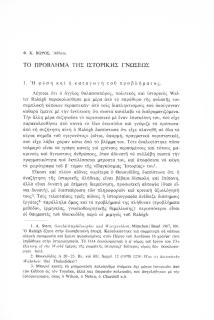
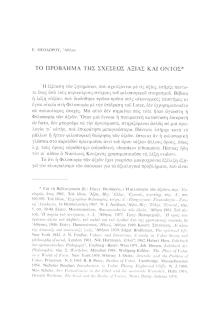
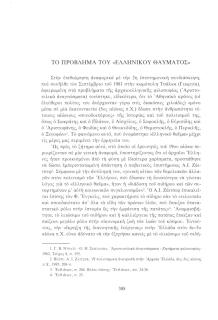
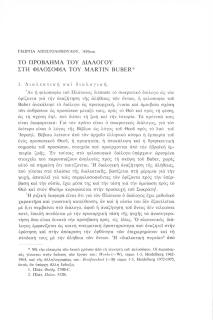
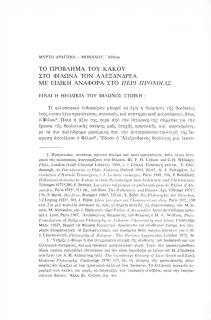
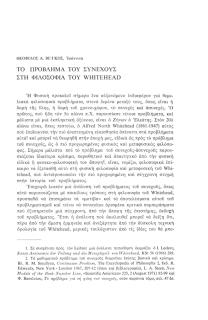
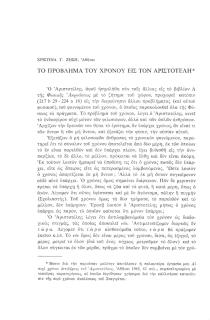
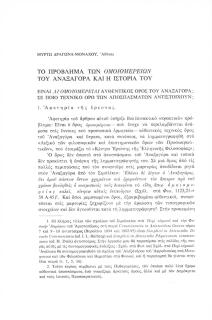
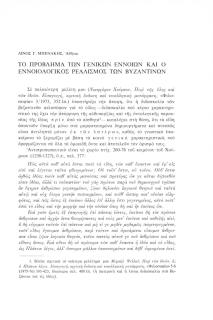
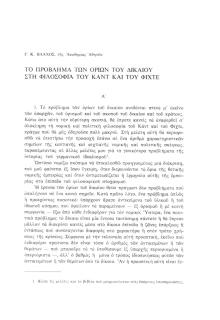
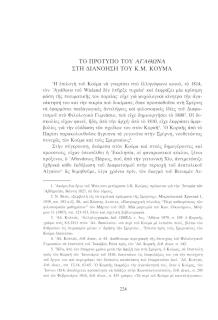
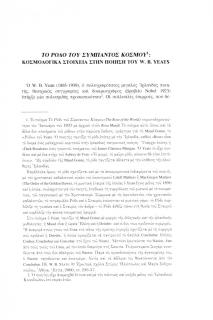 << 10
10 >>
<< 10
10 >>
Total: 4244

Το πρόβλημα της ιστορικής γνώσεως
Ενότητα: Άρθρα του περιοδικού "Φιλοσοφία"
It is the intention of the author of this article to consider the possibility and the limits of historical knowledge. The question raised can in short be stated as follows: assuming that historical statements involve multiple use of axiological judgments (selection of material, acceptance of its authenticity and its truth, explanation as well as evaluation of its content), assuming all this, is it possible to write objective history or – in other words – to reach objective historical knowledge? This problem in a very practical form has reasonably occupied the minds of all outstanding historians (among them Thucydides is a very notable case) in their search for historical truth and presentation of what actually happened. But the problem of historical truth as such has been attracting the attention of philosophers with increasing intensity from last century and has become a central problem of the Philosophy of History nowadays. A difficulty for those who have faced the problem in question arose from the fact that traditional epistemology fr...
Το πρόβλημα της σχέσεως αξίας και όντος
Ενότητα: Άρθρα του περιοδικού "Φιλοσοφία"
The ontological place of the values lies not only in the subject or the object, but rather in the relation and interaction between the two. Value is a notion which expresses the emotional and volitional relationship between the subject (the soul) and the (material or spiritual) object. The difference between value and reality can be discerned in the following points: The values are something which is ideal, but not real. The values have validity. The real being does not have validity, but exists. Moreover, value has a regulating and deontological character, which reality does not possess. The axiological order has also a polar and hierarchical structure. Values do not change with the objects, in which they are manifested. The difference between value and reality does not imply their separation. «To be different» does not mean «to be separate». Values correspond to innate predispositions within human nature and are visible within real cultural goods, in which they are materialized and realized.
Το πρόβλημα του «Ελληνικού θαύματος»
Ενότητα: Άρθρα του περιοδικού "Φιλοσοφία"
Le caractère national des anciens Grecs n΄est pas seulement la source de leurs réussites exceptionnelles dans le domaine de l΄action, mais aussi celle du déclin de la société et de la civilisation qu΄ils ont eux-mêmes créées. Ce caractère est un phenomène socio-biologique, produit des capacités génétiques naturelles et de l΄éducation, de la civilisation au sens propre. Le caractère des anciens Grecs, surtout des Athéniens, se distingue par l΄esprit belliqueux et compétitif pour la gloire, l΄estime de la liberté, qui s΄exprime dans la démocratie hellénique, la victoire des Grecs contre l΄armée colossale des Perses et leur orientation vers une "vie théorique", meilleure genre de vie et d΄action. Ce caractère des Hellènes, exigeant une immense et intense force spirituelle et corporelle, a enrichi les différents domaines de la vie et de la civilisation. Cependant, l΄esprit de la compétitivité constitue non pas seulement un principe créatif, mais aussi destructif; la guerre destructive du Péloponèse en est un exemple typique. La valeur de la co...
Το πρόβλημα του διαλόγου στη φιλοσοφία του Martin Buber
Ενότητα: Άρθρα του περιοδικού "Φιλοσοφία"
Was trennt die Platonische und die Bubersche Dialogtheorie, was verbindet sie? Platons Dialog ist eine konkreter gnoseologischer Gang, der zur Wahrheit der Seienden führen soll und aus der Sorge des Menschen um die eigene Seele lebt. Sein Vorbild ist der sokratische Dialog. Der religiöse Bezug fehlt ihm nicht, wie es z.B. in "Phaidros" aus dem Gebet von Sokrates klar wird. Bubers Horizont ist die prophetische Rede und der Bund Israels mit Gott. Dialog ist für Buber eine transzendentale Bedingung des Menschseins, die als existentielles Geschehen der Begegnung von Ich und Du realisiert wird. Der Dialektiker sucht die Schau des überzeitlichen Seins, der Dialogiker versucht die Richtung zur Begegnung zu zeigen, um das Zwischen der Begegnung zu retten. Obwohl Dialogik und Dialektik, Echtheitserlebnis und Denken, gemeinsamen Ursprungs sind, bleiben sie asymptotisch. Trotz der Kritik an der platonischen Philosophie hält auch Buber die Gestalt von Sokrates für das Vorbild des Philosophierens. Sokrates realisierte die Begegnung von Ich und Du als B...
Το πρόβλημα του κακού στο Φίλωνα τον Αλεξανδρέα με ειδική αναφορά στο Περί προνοίας
Ενότητα: Άρθρα του περιοδικού "Φιλοσοφία"
It has been argued, especially by P. Barth, that Philo’s theodicy is either a continuation or modification or lastly a true repetition of Stoic theodicy. The author of this paper believes that this is only partly true in the De providentia and with regard to natural evil, but not in Philo’s work as a whole or with respect to metaphysical and moral evil. More specifically, through a quick survey of Philo’s theological (exegetic) work and after a thorough investigation into and analysis of the De providential, the author reached the following conclusions regarding the character of Philo’s theodicy and his debts to his philosophical predecessors, which somewhat modify some generally accepted view. From the De opificio mundi and some other exegetical treatises it appears that Philo is closer to Plato and the Pythagoreans than to the Stoics in considering metaphysical evil as due to the imperfection inherent in the status of the creatures and perhaps to matter and its resistance to the divine purposes, and in attributing moral evil to human f...
Το πρόβλημα του συνεχούς στη φιλοσοφία του Whitehead
Ενότητα: Άρθρα του περιοδικού "Φιλοσοφία"
Le problème du continu qui, pour la première fois, a été présenté dans les fameux «paradoxes» de Zénon d'Élée demeure toujours vital, en particulier du point de vue physique. Whitehead est le philosophe qui au 20e siècle s'est beaucoup occupé de ce problème. Il l'a étudié à fond et lui a donné un nouvel essort. Sa pensée représente l'étape la plus contemporaine et la plus avancée dans l'histoire du problème en question. Whitehead substituant à la «matière» la réalité des événements (events) est conduit à une contemplation de ces événements dans toute leur étendue. Les événements sont mis en correlation par le rapport de l'extension. Ainsi la continuité de la nature est thème qui l'élève par l'extensibilité des événements: chaque événement et tous les événements ensemble constituent une continuité de la nature (the continuity of nature is the continuity of events), étant donné que la continuité des événements ressort de la structure extensive de correlativité, «wheverer and whenever something is going on, there is an event». Cela signifie ...
Το πρόβλημα του χρόνου εις τον Αριστοτέλη
Ενότητα: Άρθρα του περιοδικού "Φιλοσοφία"
Von Aristoteles wird die Frage nach dem Wesen der Zeit so gestellt: ob sie zum Seienden oder zum Nichtseienden gehöre. Der Inbegriff der Zeit besteht aus zwei nicht existierenden Abschnitten: die Vergangenheit und die Zukunft, so daß wir glauben könnten, daß die Zeit gar nicht oder in dunkler Weise existiere. Zeit aber bedeutet Dauer. Das «Jetzt» ist keine Zeit; es ist nur eine dauerlose Grenze zwischen Vergangenheit und Zukunft. Es ist ein Punkt. Die vorphilosophischen Theorien geben keine Lösung des gestellten Problems. Die eine behauptete, daß die Zeit identisch mit der Himmelsschale sei, und die andere, die Zeit sei die Bewegung selbst. Es scheint, gewiß daß die Zeit eine Art Bewegung sei, aber sie ist nicht Bewegung. Diese spielt sich nur an einem Bewegenden selbst und allein an dem Ort wo es sich befindet ab. Die Zeit aber ist in gleicher Weise bei allem. Ferner gibt es keine schnellere oder langsamere Zeit. Doch Bewegung und Zeit sind untrennbar. Wir haben kein Zeitbewußtsein ohne Bewegung. Die Zeit also ist etwas an der Bewegung. ...
Το πρόβλημα των «ομειομερειών» του Αναξαγόρα και η ιστορία του
Ενότητα: Άρθρα του περιοδικού "Φιλοσοφία"
The investigation of the much discussed problem of the «homoeomeries» of Anaxagoras was initially stimulated by the need to meet a «practical» problem: should the word ομοιομέρειαι, often presumed to be a technical term of Anaxagoras, be an entry in the «Lexicon of the philosophical and scientific terms of the Presocratics» now in the preparation by the «Research Center for Greek Philosophy» at the Academy of Athens? The word does not occur in Anaxagoras’ extant fragments. However, among the many instances of its application to Anaxagorean physics in the testimonia, one explicit attribution by Simplicius (59 A 45 DK) is exceptionally important and should be taken into serious consideration, since Simplicius is our main authority for Anaxagoras’ physical fragments. Actually Diels (though not Lanza) spaces the term in this instance; and this conventional indication of its authenticity commits us to making an entry of it in the lexicon, unless we are convince by close research that it is spurious. And, although most modern scholars, contrary...
Το πρόβλημα των γενικών εννοιών και ο Εννοιολογικός Ρεαλισμός των Βυζαντινών
Ενότητα: Άρθρα του περιοδικού "Φιλοσοφία"
Hinsichtlich des Problems der Substanz vollzieht sich nach Aristoteles Tod schon innerhalb seiner eigenen Schule eine Verschiebung von der metaphysischen Problematik zu den Problemen, welche das einleitende Werk des "Organon", die Kategorien, stellt. In der Spätantike und besonders von den Nachfolgern Plotins wurden die Kategorien immer wieder kommentiert und interpretiert. Gerade im Bereich der Problematik der allgemeinen Begriffe ist der Einfluß Piatons auf das Denken der neuplatonischen Kommentatoren des Aristoteles sehr deutlich. Die neue Interpretation reicht bis zur Umstellung des Verhältnisses von "erster" zu "zweiter Substanz"; das Primat hat jetzt die "zweite Substanz", das Noetische oder die allgemeine Wesenheit, weil sie nicht nur bewußtseinsunabhängige Realität, sondern sogar eine wirklichere Wirklichkeit als die materiellen Dingen besitzt. Dazu deckt sich auch diese Wesenheit weitaus mit der platonischen Idee. Durch die berühmte Isagoge des Porphyrios, welche sehr früh ins Lateinische übersetzt und kommentiert worden ist (Boe...
Το πρόβλημα των ορίων του δικαίου στη φιλοσοφία του Καντ και του Φίχτε
Ενότητα: Άρθρα του περιοδικού "Φιλοσοφία"
La recherche des frontières du Droit suscite deux problèmes concomitants. Premièrement, un problème purement quantitatif: y a-t-il des objets du monde matériel ou idéel, qui doivent demeurer par définition ou par convention — en dehors de tout intérêt pour le juriste? Deuxièmement, un problème qualitatif: le Droit est-il une notion toujours identique à elle-même ou bien faudrait-il plutôt discerner à l΄intérieur du juridique des niveaux ou des zones d΄existence ou d΄intensité impliquant des différences dans le caractère et l΄usage du jugement? Dans cette dernière perspective, ce qui intéresse au premier chef ce n΄est pas tant le nombre d΄objets ou de matières — que l΄on peut supposer initialement limités ou illimités — mais le degré d΄appropria-tion ou seulement le mode d΄appropriation de ces objets ou matières par le Droit. Si cette perspective est valable, il ne conviendrait plus de parler seulement de Droit et de non-Droit, mais aussi d΄un Droit plus ou moins authentique, d΄un Droit plus ou moins juridique et même d΄un faux Droit. Pour...
Το πρότυπο του Αγάθωνα στη διανόηση του Κ. Μ. Κούμα
Ενότητα: Άρθρα του περιοδικού "Φιλοσοφία"
C΄est en 1814, que C.M. Coumas publie sa traduction en grec moderne de l΄ Agathon de Wieland. Cette démarche n΄est pas sans signification pour son propre itinéraire intellectuel, ainsi que les dificultés qu΄il rencontre lors de son séjour à Smyrne, en ce qui concerne la réalisation des idées pédagogiques des Lumières. En se référant au personnage d΄Agathon, il adresse une critique aux Sophistes de l΄Antiquité qui s΄applique également aux ΄sophistes΄ de son temps et se prononce contre leur subjectivisme. Coumas s΄oriente vers une morale de l΄art de vivre et s΄éloigne de l΄éthique kantienne qu΄il propose dans son Syntagma Philosophias quelques années plus tard.

